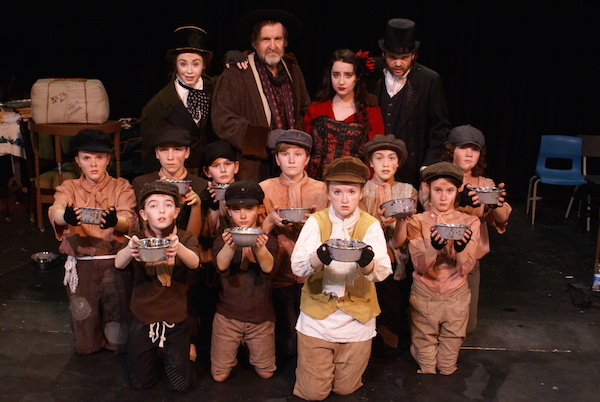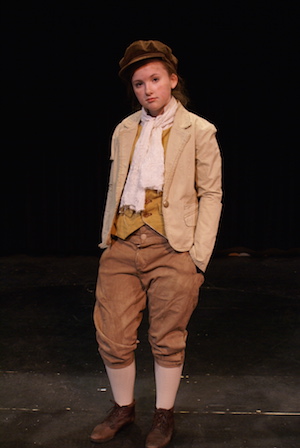
When Lionel Bart’s musical adaptation of Oliver Twist appeared in the 1960’s, much of its critical acclaim was directed at the sparseness of its presentation. While Oliver!’s song score was composed almost entirely of upbeat earworms, it shunned the schmaltz and sentimentality of the big Broadway shows: almost every song (except for Oliver’s and, oddly enough, villain Bill Sykes’) is a lesson in finely-tuned irony and hypocrisy.
It was a dark tale after all: Oliver Twist was birthed in a workhouse and raised there as an orphan after his mother died giving him life. Being elected the other to ask for more gruel (“Please, sire, I want some more”) and summarily sold off, by Mr. Bumble the beadle, as an apprentice funeral mourner for his rebellion, Oliver soon find himself on the London streets where he is quickly recruited by expert pickpocket the Artful Dodger, in the oily Fagin’s gang of gin-swilling boy street thieves. He meets Nancy, the paramour of the infamous and brutish Bill Sykes, and she is touched by the boy’s innocence. On his first foray into street crime, he is apprehended holding a gentleman’s stolen handkerchief. Cleared of the crime, Mr. Brownlow, the gentleman, takes him into his home perplexed by Oliver’s resemblance to his long missing daughter. Meanwhile, Fagin and Sykes enlist the reluctant Nancy to retrieve him before Oliver can inform on them (and possibly enjoy the privileged life they can only scavenge crumbs from).
The Boardmore Theatre’s current production of Oliver! (and that exclamation point was the only thing the show was derided for) reclaims much of the Spartan quality of the original vision of the show (there are no high kicking show-stopping dance numbers so beloved from the movie version), it does get to the emotional heart of the story and doesn’t pull away from the sheer brutality of Dickens’ original story. (Another aside: one of Dickens’ most popular stage readings he gave, after A Christmas Carol, was a full-blooded recitation of the murder of Nancy: an event most of his well-fed audience would never had occasion to experience firsthand).
Director Todd Hiscock chose to focus on the actors and the dynamic between their characters. The result is a fast-paced musical play of raw emotions, dark and light, that can make the audience laugh out loud, shudder in horror, and smile at a happy ending while it makes them think not only about the long ago social injustices Of Dickens’ England, but also of those outside the theatre doors.

Ian Green has a fine ironic growl as Fagin. This is the show’s scene-stealing role and Green milks it for all of its humour. When he tells his coterie of lost boys to “Shut up and drink your gin”, it’s both hilarious and shocking and oddly fatherly. Sometimes his wide-brimmed hat robbed the audience of Green’s expressive face, but “reviewing the situation” Green’s Fagin was always on the mark.
Emily O’Leary, as Nancy, was, after Danyluk’s Oliver, the emotional heart of the play. With her character trapped in a life which offered no escape, O’Leary’s performance had true grit and heart to convince the audience she did not deserve such a bleak existence. O’Leary also has an excellent singing voice, with enough of a playful smirk when called for, to make pub songs “Omph Pa Pa” fun and more serious songs like “As Long As He Needs Me” heartbreaking.
As the Artful Dodger, the human sparkplug of talent Leslie MacLean added a dancer’s energy to “Consider Yourself at Home” and humour and spontaneity to every scene she appeared in. Like every other member of the cast, she has a bold expressive voice that should be heard more from on stage.
Ron Newcombe, as Mr. Bumble, and Emma Francis, Widow Corney, made a fine comedic pairing; pompous, judgmental, and unforgiving in their little bit of status. I’ll say it again, blessed with fine voices and not afraid to use them. Two solid performances.
As were Craig Varnes and Anita Woodford-Danyluk, as Mr. and Mrs Sowerberry, the morticians. Funny, harsh about the world, but somehow both with a modicum of compassion.
Brandon MacLellan, as their apprentice Noah Claypole, in a short scene asserting his authority over Oliver, did excellent work as one of society’s acceptable villains. His Noah was such a bully it was fun to see Oliver give him his comeuppance.
Rob Lewandowski as Mr. Brownlow, Ron Williams as Dr. Grimwig, and Kristen Woodford as Mrs. Bedwin, made an effective trio of goodwill and compassion. Their bullish goodwill as a team reassured the audience that, at least for Oliver, everything would be right with the world.
Without having to say much, just by the arrogance of his body language, Phonse Walsh made Bill Sykes a potent, menacing presence. In Walsh’s note-perfect performance, Sykes’ few songs are more growls of violence and pain and hope utterly pressed out of a human soul. We still have our Bill Sykes, those who would rather burn in hell than fade into silence. Walsh’s performance captures that brutality.
The chorus players all worked at the same high level of their cast mates in various small and sundry roles. Their acting did much to set the emotional tone of every scene they were in and I didn’t hear a single bum note from the teeming multitude of them. Space doesn’t allow mentioning them all by name but they all deserve individual commendation.
Todd Hiscock’s direction was full of detail and attentive to the dynamic of every scene of the play. He knows how to coach actors, both veterans and first-timers, to performances that are full of real emotion and carried out with urgency. His use of a turntable stage for the interiors and an upper level for several crowd scenes gave the production visual flare. His Oliver! moves with energy and purpose and lacks a single lull or false note.
His musical director, Barb Stetter, shares many of Hiscock’s qualities in her approach to the material. The excellent singing of her cast evidenced her fine ear and attention to detail and her live pit orchestra propelled the play along as much as the performances.
The show’s designers–Diana MacKinnon-Furlong with costumes, Penny Steele and Cheryl Bray with set design, and Ken Heaton with lighting design–created a real Dickensian world on stage. Fine professional quality from all of them.
Oliver! addresses some real social concerns among all of the high spirits and adventure and this production delivers on all of that and more.
Oliver! runs at the Cape Breton University Boardmore Playhouse nightly at 7pm till Saturday, February 25, before finishing on Sunday, February 26, with a 2pm matinee. Tickets are $20 general admission, $10 students/seniors (no assigned seating). Call CBU Playhouse Box Office for tickets at 563-1652. The Box Office is open 1pm to 5pm Monday to Friday and one hour before show time. Buy early and come early, the first two performances attracted capacity audiences.

